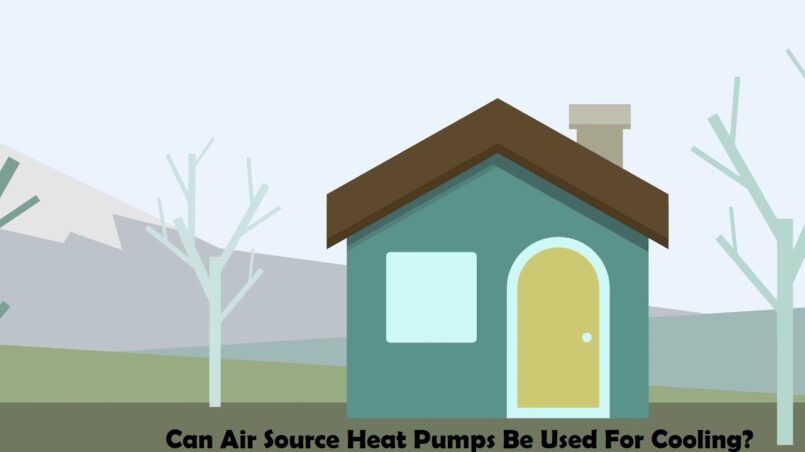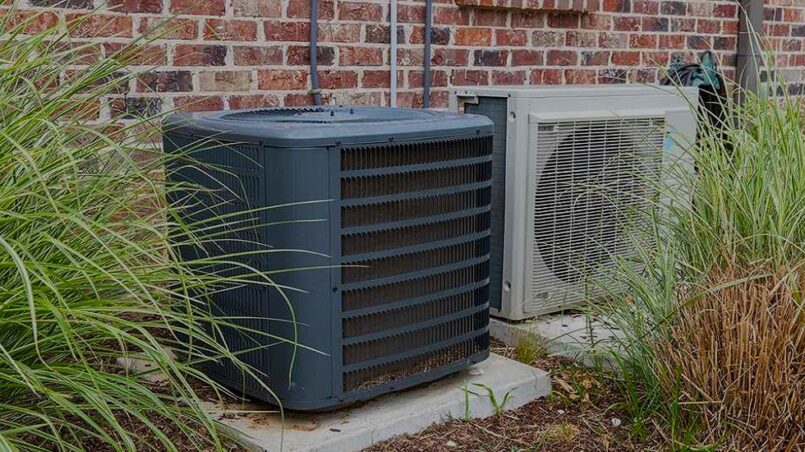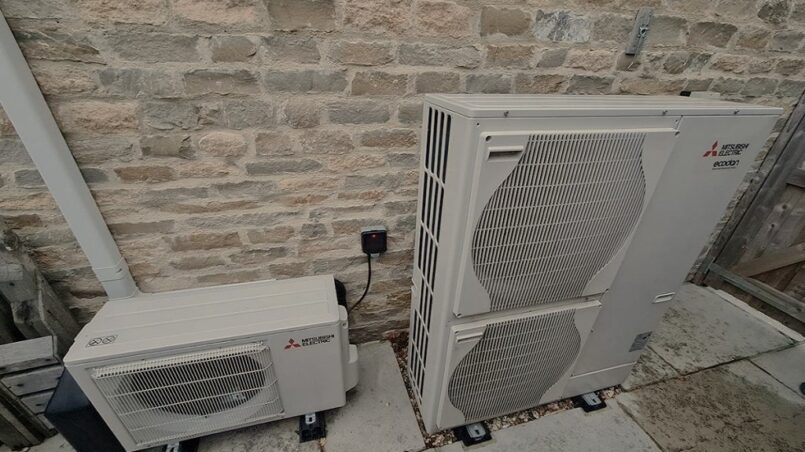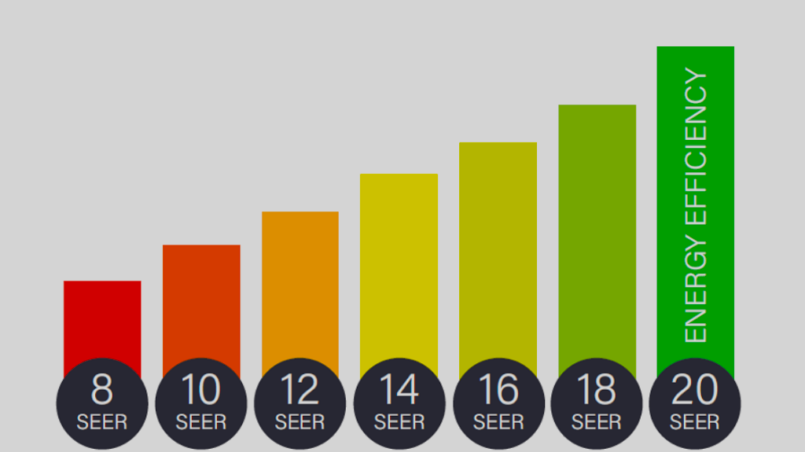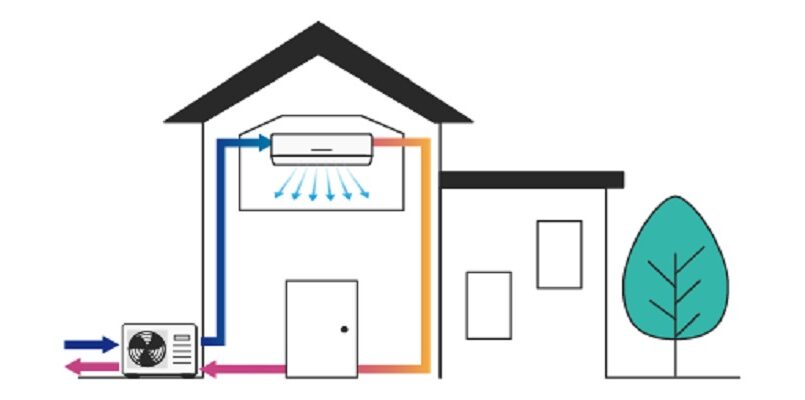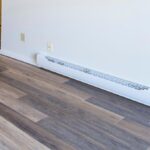Are you tired of sweltering summers, dreaming of a cool and comfortable indoor oasis? Enter the world of air source heat pump cooling. These cutting-edge devices, often associated with heating, are hiding a little-known secret – they can also be your ticket to efficient and environmentally friendly air conditioning.
Intrigued? In this blog, we’ll delve into the fascinating realm of air source heat pump cooling mode, exploring how these marvels of technology can transform your home into a year-round haven of comfort. Say goodbye to the scorching heat and hello to the energy-efficient cooling power of air source heat pumps. Get ready to discover the solution you’ve been longing for!
What’s the Deal with Air Source Heat Pump Cooling?
Air source heat pumps (ASHPs) are a versatile and efficient heating and cooling technology. They work by transferring heat between the outside air and the inside of a building. In heating mode, they absorb heat from the outside air and transfer it to the inside. In cooling mode, they absorb heat from the inside air and transfer it to the outside.
ASHPs can be used to cool homes in a variety of climates. However, they are most effective in climates where the outside temperature does not drop below freezing for extended periods of time. In colder climates, ASHPs may need to use supplemental heating during the winter months.
One of the main benefits of using an ASHP for cooling is that it is very energy efficient. ASHPs can transfer more heat energy to a building than the electrical energy they consume. This makes them a more efficient cooling option than traditional air conditioners, which use electricity to generate cool air.
Another benefit of ASHPs is that they are environmentally friendly. ASHPs do not produce any greenhouse gas emissions. They also do not require any fossil fuels, such as natural gas or propane.
However, there are a few potential downsides to using an ASHP for cooling. One downside is that they can be more expensive to install than traditional air conditioners. Another downside is that they may not be as effective at cooling homes in very hot climates.
Overall, ASHPs are a good option for cooling homes in a variety of climates. They are energy efficient, environmentally friendly, and can provide year-round comfort.
Cooling with Air Source Heat Pumps
Alright, let’s get into the nitty-gritty of how air source heat pumps cool your home. It’s all about that magical process called “reversing the cycle.” Here’s how it works:
- Reversing the Flow: During the cooling mode, the heat pump reverses the flow of its refrigerant. Instead of absorbing heat from the outdoor air and bringing it inside, it does the opposite. It takes heat from inside your home and releases it outside.
- Indoor Comfort: As the refrigerant absorbs heat from your indoor air, it cools down the air inside your home. Think of it like a sponge soaking up water – except in this case, it’s soaking up heat.
- Outdoor Disposal: The heat absorbed from your indoor air is then released outside, and voilà, you’re left with cooler air indoors.
It’s a bit like having a magic wand that can make your living room feel like a cozy ice cream parlor on a hot summer day.
Why Choose Air Source Heat Pumps for Cooling?
Now, you might be wondering why you should consider air source heat pumps for cooling when traditional air conditioners are readily available. Well, hold on to your sunhat because we’re about to drop some knowledge bombs:
- Energy Efficiency: Air source heat pumps are renowned for their energy efficiency. They use electricity to move heat, rather than generating it by burning fossil fuels. This means they can provide cooling at a fraction of the energy cost of traditional AC units.
- Year-Round Comfort: The beauty of air source heat pumps is that they can handle both heating and cooling. You get a two-for-one deal, making them an excellent investment for year-round comfort.
- Environmentally Friendly: If you’re all about reducing your carbon footprint, air source heat pumps are your pals. They produce fewer greenhouse gas emissions compared to conventional heating and cooling systems.
- Quiet Operation: Traditional air conditioners can be noisy neighbors, but air source heat pumps are known for their quiet operation. You won’t even know they’re there, except for the delightful temperature changes.
- No Ductwork, No Problem: If your home doesn’t have ductwork, installing a central air conditioner can be a costly hassle. Air source heat pumps can be ductless, making them a more versatile cooling solution for older homes or spaces without ducts.
- Zoning Control: With some models, you can have different temperature zones in your home. So, if you prefer a chilly bedroom and a cozy living room, you can have it all without sacrificing efficiency.
Understanding Efficiency and SEER Ratings
Alright, we’ve established that air source heat pumps are efficient, but how can you tell just how efficient they are? Enter SEER ratings.
SEER stands for Seasonal Energy Efficiency Ratio. It’s like the miles per gallon (MPG) rating for your car but for your cooling system. The higher the SEER rating, the more efficient the air source heat pump is at cooling your home.
To give you some context, a traditional central air conditioner might have a SEER rating of 14-16, while a high-efficiency air source heat pump can go all the way up to 20 or more. So, not only are you staying cool, but you’re doing it while sipping on an energy-saving smoothie!
Air Source Heat Pump Cooling Mode Chart
Here is a sample air source heat pump cooling mode chart:
| Outdoor Air Temperature (°F) | Cooling Capacity (BTU/h) |
| 95 | 18,000 |
| 90 | 19,000 |
| 85 | 20,000 |
| 80 | 21,000 |
| 75 | 22,000 |
| 70 | 23,000 |
| 65 | 24,000 |
| 60 | 25,000 |
| 55 | 26,000 |
| 50 | 27,000 |
| 45 | 28,000 |
| 40 | 29,000 |
| 35 | 30,000 |
Maintenance and Longevity
Now, let’s talk about maintenance and the lifespan of air source heat pumps. Just like your car, these systems need a bit of TLC to keep running smoothly.
- Regular Maintenance: It’s essential to schedule regular maintenance for your air source heat pump. This includes cleaning or replacing air filters, checking refrigerant levels, and ensuring all components are in tip-top shape. Regular maintenance can extend the life of your system and keep it running efficiently.
- Longevity: With proper care, an air source heat pump can last anywhere from 15 to 20 years or more. That’s a lot of summers and winters of reliable comfort!
- Warranty: Many manufacturers offer warranties on their heat pumps, covering parts and labor for a specified period. Make sure to read and understand the warranty terms, as they can vary from one brand to another.
Limitations of Air Source Heat Pumps for Cooling
Now, we’ve sung the praises of air source heat pumps, but it’s only fair to talk about their limitations as well:
- Climate Considerations: Air source heat pumps are most efficient in moderate climates. In extremely cold or hot regions, they may not be as effective. In such cases, you might need a backup heating or cooling system.
- Initial Cost: The upfront cost of purchasing and installing an air source heat pump can be higher than a traditional central air conditioner. However, the energy savings over time can offset this initial investment.
- Noise: While air source heat pumps are generally quieter than traditional AC units, they can still produce some noise, especially if not properly installed.
- Space Requirements: Heat pumps require outdoor space for installation. If you have limited outdoor space or live in a densely populated area, this could be a challenge.
FAQs
Now that we’ve covered the basics, let’s dive into some frequently asked questions about air source heat pumps and their cooling capabilities.
-
Can air source heat pumps cool a whole house?
Absolutely! Air source heat pumps can efficiently cool an entire home, just like traditional central air conditioners. They can also be used for spot cooling in specific rooms or zones if you prefer.
-
Are air source heat pumps as effective as traditional air conditioners at cooling?
Yes, air source heat pumps can be as effective as traditional air conditioners, and in some cases, even more so due to their energy efficiency. Their cooling performance is measured by their SEER rating, and high-efficiency models can match or exceed the cooling performance of conventional AC units.
-
Can air source heat pumps provide cooling in extremely hot climates?
While air source heat pumps are efficient in moderate climates, they may struggle to provide sufficient cooling in extremely hot regions. In such areas, you might need a supplemental cooling system or consider a different type of heat pump, such as a ground source (geothermal) heat pump.
-
Do air source heat pumps require a lot of maintenance for cooling?
Air source heat pumps, like any HVAC system, do require regular maintenance to ensure optimal performance. This includes tasks like cleaning or replacing filters and checking refrigerant levels. However, the maintenance requirements for cooling are generally similar to those for heating, so you’re not adding extra work when using your heat pump for cooling.
-
Are air source heat pumps environmentally friendly for cooling?
Yes, air source heat pumps are considered environmentally friendly for cooling. They use electricity to move heat, which is a more efficient and less environmentally impactful process compared to burning fossil fuels for cooling. Using a heat pump for cooling can help reduce your carbon footprint and lower greenhouse gas emissions.
In Conclusion
The potential of air source heat pump cooling is a game-changer in the world of home climate control. With the ability to seamlessly switch to cooling mode, these innovative systems offer an efficient and eco-friendly solution for beating the heat. The air source heat pump cooling mode not only delivers comfortable temperatures but also reduces energy consumption, ultimately saving you money.
So, if you’ve ever wondered, “Can air source heat pumps cool?” the answer is a resounding yes. Don’t miss out on the opportunity to enjoy year-round comfort with the same system that keeps you warm in the winter. Take action today and explore the benefits of air source heat pump air conditioning for your home. Say goodbye to traditional cooling methods and embrace a greener, more cost-effective future. Your journey to a cooler, more sustainable home begins now!

